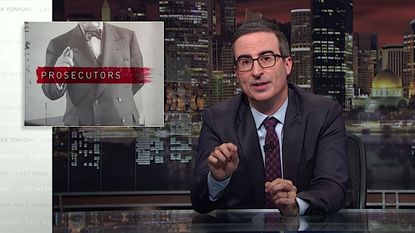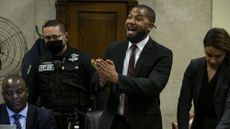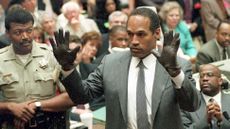John Oliver explains the problems with prosecutors, notes you can usually vote the bad ones out


On Sunday's Last Week Tonight, John Oliver shone a little light on an important person in your community who, if you are lucky, you don't think about very often, if ever. "Whenever we talk about criminal justice reform, we tend to just talk about policing, public defenders, judges, and prisons, and skip over a crucial element there: prosecutors, the attorneys who work for the federal, state, and local government and bring cases to trial," he said. "Prosecutors decide whether you get charged and what you get charged with, and therefore heavily influence what kind of sentence you could face."
People tend to overlook the power prosecutors have, so "let's start with a truly incredible fact here: The vast majority of the time, your fate is not decided by a judge or a jury of your peers, because nearly 95 percent of the cases prosecutors decide to bring end up with the defendant pleading guilty," Oliver said. Judges are mostly resigned to this system, "because at least plea bargains keep the system moving," he explained, and prosecutors have a lot of tools to get innocent people to plead guilty.
For the 5 percent who opt for a trial, prosecutors control the case files, sometimes "ambush" the defense with exculpatory evidence right before the trial, or they never hand it over — and when they are caught withholding evidence, Oliver found only one district attorney ever held to account, barely. He gave some egregious examples of misconduct and suggested some legislative fixes, but argued the easiest way to hold prosecutors accountable is to elect reform-minded district attorneys. Which requires a little bit of research. "Most people know as much about their local D.A. as they know about their local Cheesecake Factory manager," he said: "Chances are, you don't know who they are, and if you do, it's probably because something truly terrible has happened." There is NSFW language. Watch below. Peter Weber
Subscribe to The Week
Escape your echo chamber. Get the facts behind the news, plus analysis from multiple perspectives.

Sign up for The Week's Free Newsletters
From our morning news briefing to a weekly Good News Newsletter, get the best of The Week delivered directly to your inbox.
From our morning news briefing to a weekly Good News Newsletter, get the best of The Week delivered directly to your inbox.
Sign up for Today's Best Articles in your inbox
A free daily email with the biggest news stories of the day – and the best features from TheWeek.com
Peter has worked as a news and culture writer and editor at The Week since the site's launch in 2008. He covers politics, world affairs, religion and cultural currents. His journalism career began as a copy editor at a financial newswire and has included editorial positions at The New York Times Magazine, Facts on File, and Oregon State University.
-
 Patria Palace: a chic, relaxing bolthole in the heart of Lecce
Patria Palace: a chic, relaxing bolthole in the heart of LecceThe Week Recommends Elegant hotel with stunning views of the city's baroque cathedral and access to a beach club on the Adriatric coast
By Nick Hendry Published
-
 'One lesson concerns the uses and limits of military power'
'One lesson concerns the uses and limits of military power'Instant Opinion Opinion, comment and editorials of the day
By Justin Klawans, The Week US Published
-
 Today's political cartoons - December 3, 2024
Today's political cartoons - December 3, 2024Cartoons Tuesday's cartoons - elves at work, crystal clear, and more
By The Week US Published
-
 Drake claims illegal boosting, defamation
Drake claims illegal boosting, defamationSpeed Read The rapper accused Universal Music of boosting Kendrick Lamar's diss track and said UMG allowed him to be falsely accused of pedophilia
By Rafi Schwartz, The Week US Published
-
 'Wicked' and 'Gladiator II' ignite holiday box office
'Wicked' and 'Gladiator II' ignite holiday box officeSpeed Read The combination of the two movies revitalized a struggling box office
By Peter Weber, The Week US Published
-
 Jussie Smollet conviction overturned on appeal
Jussie Smollet conviction overturned on appealSpeed Read The Illinois Supreme Court overturned the actor's conviction on charges of staging a racist and homophobic attack against himself in 2019
By Peter Weber, The Week US Published
-
 Quincy Jones, music icon, is dead at 91
Quincy Jones, music icon, is dead at 91Speed Read The legendary producer is perhaps best known as the architect behind Michael Jackson's 'Thriller'
By Peter Weber, The Week US Published
-
 OJ Simpson, star athlete tried for murder, dead at 76
OJ Simpson, star athlete tried for murder, dead at 76Speed Read The former football hero and murder suspect lost his battle with cancer
By Rafi Schwartz, The Week US Published
-
 Momofuku's 'Chili Crunch' trademark uproar
Momofuku's 'Chili Crunch' trademark uproarSpeed Read The company's attempt to own the sole rights has prompted backlash
By Rafi Schwartz, The Week US Published
-
 Kevin Hart awarded Mark Twain Prize
Kevin Hart awarded Mark Twain PrizeSpeed Read He is the 25th recipient of the prestigious comedy prize
By Peter Weber, The Week US Published
-
 Is Downton Abbey set to return for a final film?
Is Downton Abbey set to return for a final film?Speed Read Imelda Staunton reveals that a third movie may be in the pipeline
By Adrienne Wyper, The Week UK Published